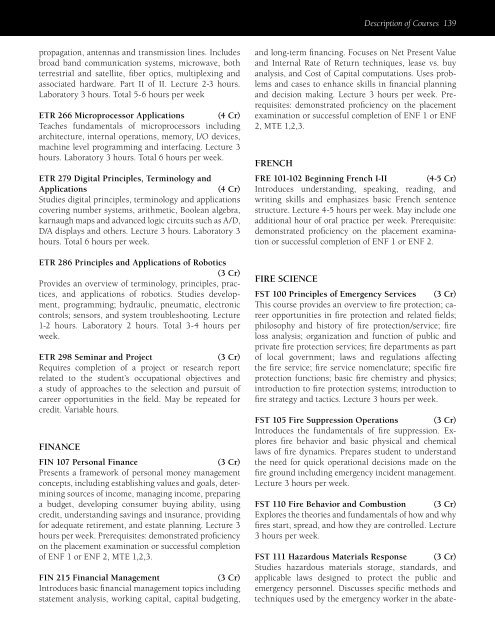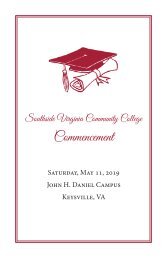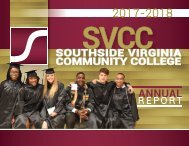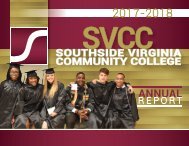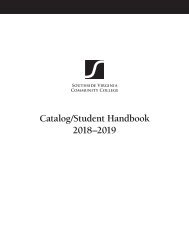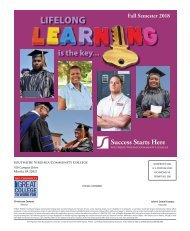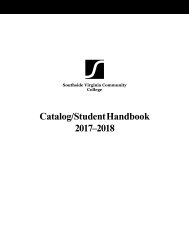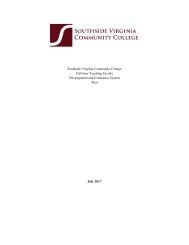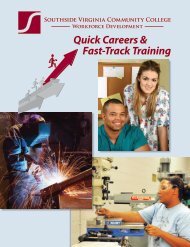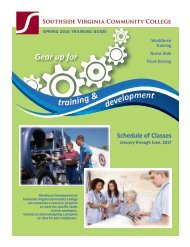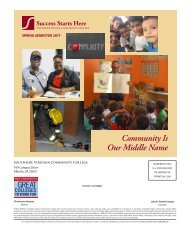SVCC Catalog 2017-2018
The programs and courses offered at Southside Virginia Community College. To learn more, go to www.southside.edu
The programs and courses offered at Southside Virginia Community College. To learn more, go to www.southside.edu
Create successful ePaper yourself
Turn your PDF publications into a flip-book with our unique Google optimized e-Paper software.
Description of Courses 139<br />
propagation, antennas and transmission lines. Includes<br />
broad band communication systems, microwave, both<br />
terrestrial and satellite, fiber optics, multiplexing and<br />
associated hardware. Part II of II. Lecture 2-3 hours.<br />
Laboratory 3 hours. Total 5-6 hours per week<br />
ETR 266 Microprocessor Applications (4 Cr)<br />
Teaches fundamentals of microprocessors including<br />
architecture, internal operations, memory, I/O devices,<br />
machine level programming and interfacing. Lecture 3<br />
hours. Laboratory 3 hours. Total 6 hours per week.<br />
ETR 279 Digital Principles, Terminology and<br />
Applications<br />
(4 Cr)<br />
Studies digital principles, terminology and applications<br />
covering number systems, arithmetic, Boolean algebra,<br />
karnaugh maps and advanced logic circuits such as A/D,<br />
D/A displays and others. Lecture 3 hours. Laboratory 3<br />
hours. Total 6 hours per week.<br />
ETR 286 Principles and Applications of Robotics<br />
<br />
(3 Cr)<br />
Provides an overview of terminology, principles, practices,<br />
and applications of robotics. Studies development,<br />
programming; hydraulic, pneumatic, electronic<br />
controls; sensors, and system troubleshooting. Lecture<br />
1-2 hours. Laboratory 2 hours. Total 3-4 hours per<br />
week.<br />
ETR 298 Seminar and Project<br />
(3 Cr)<br />
Requires completion of a project or research report<br />
related to the student’s occupational objectives and<br />
a study of approaches to the selection and pursuit of<br />
career opportunities in the field. May be repeated for<br />
credit. Variable hours.<br />
FINANCE<br />
FIN 107 Personal Finance<br />
(3 Cr)<br />
Presents a framework of personal money management<br />
concepts, including establishing values and goals, determining<br />
sources of income, managing income, preparing<br />
a budget, developing consumer buying ability, using<br />
credit, understanding savings and insurance, providing<br />
for adequate retirement, and estate planning. Lecture 3<br />
hours per week. Prerequisites: demonstrated proficiency<br />
on the placement examination or successful completion<br />
of ENF 1 or ENF 2, MTE 1,2,3.<br />
FIN 215 Financial Management<br />
(3 Cr)<br />
Introduces basic financial management topics including<br />
statement analysis, working capital, capital budgeting,<br />
and long-term financing. Focuses on Net Present Value<br />
and Internal Rate of Return techniques, lease vs. buy<br />
analysis, and Cost of Capital computations. Uses problems<br />
and cases to enhance skills in financial planning<br />
and decision making. Lecture 3 hours per week. Prerequisites:<br />
demonstrated proficiency on the placement<br />
examination or successful completion of ENF 1 or ENF<br />
2, MTE 1,2,3.<br />
FRENCH<br />
FRE 101-102 Beginning French I-II (4-5 Cr)<br />
Introduces understanding, speaking, reading, and<br />
writing skills and emphasizes basic French sentence<br />
structure. Lecture 4-5 hours per week. May include one<br />
additional hour of oral practice per week. Prerequisite:<br />
demonstrated proficiency on the placement examination<br />
or successful completion of ENF 1 or ENF 2.<br />
FIRE SCIENCE<br />
FST 100 Principles of Emergency Services (3 Cr)<br />
This course provides an overview to fire protection; career<br />
opportunities in fire protection and related fields;<br />
philosophy and history of fire protection/service; fire<br />
loss analysis; organization and function of public and<br />
private fire protection services; fire departments as part<br />
of local government; laws and regulations affecting<br />
the fire service; fire service nomenclature; specific fire<br />
protection functions; basic fire chemistry and physics;<br />
introduction to fire protection systems; introduction to<br />
fire strategy and tactics. Lecture 3 hours per week.<br />
FST 105 Fire Suppression Operations (3 Cr)<br />
Introduces the fundamentals of fire suppression. Explores<br />
fire behavior and basic physical and chemical<br />
laws of fire dynamics. Prepares student to understand<br />
the need for quick operational decisions made on the<br />
fire ground including emergency incident management.<br />
Lecture 3 hours per week.<br />
FST 110 Fire Behavior and Combustion (3 Cr)<br />
Explores the theories and fundamentals of how and why<br />
fires start, spread, and how they are controlled. Lecture<br />
3 hours per week.<br />
FST 111 Hazardous Materials Response (3 Cr)<br />
Studies hazardous materials storage, standards, and<br />
applicable laws designed to protect the public and<br />
emergency personnel. Discusses specific methods and<br />
techniques used by the emergency worker in the abate-


